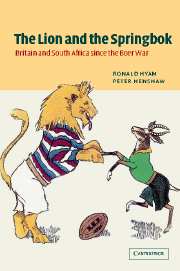Book contents
- Frontmatter
- Contents
- List of illustrations
- List of tables
- Preface
- Acknowledgements
- List of abbreviations
- 1 The uneasy special relationship: dynamics and divergencies
- 2 Breakdown: into war, 1895–1899
- 3 Post-war: the myth of magnanimity, 1905–1907
- 4 African interests and the South Africa Act, 1908–1910
- 5 ‘Greater South Africa’: the struggle for the High Commission Territories, 1910–1961
- 6 The economic dimension: South Africa and the sterling area, 1931–1961
- 7 Britain, the United Nations, and the ‘South African disputes’, 1946–1961
- 8 The political consequences of Seretse Khama and Ruth, 1948–1952
- 9 Containing Afrikanerdom: the geopolitical origins of the Central African Federation, 1948–1953
- 10 Strategy and the transfer of Simon's Town, 1948–1957
- 11 The parting of the ways: the departure of South Africa from the Commonwealth, 1951–1961
- 12 Enfeebled lion? How South Africans viewed Britain, 1945–1961
- 13 Springbok reviled: some British reactions to apartheid, 1948–1994
- Epilogue The relationship restored: the return of the new South Africa to the Commonwealth, 1994
- Select bibliography
- Index
9 - Containing Afrikanerdom: the geopolitical origins of the Central African Federation, 1948–1953
Published online by Cambridge University Press: 03 December 2009
- Frontmatter
- Contents
- List of illustrations
- List of tables
- Preface
- Acknowledgements
- List of abbreviations
- 1 The uneasy special relationship: dynamics and divergencies
- 2 Breakdown: into war, 1895–1899
- 3 Post-war: the myth of magnanimity, 1905–1907
- 4 African interests and the South Africa Act, 1908–1910
- 5 ‘Greater South Africa’: the struggle for the High Commission Territories, 1910–1961
- 6 The economic dimension: South Africa and the sterling area, 1931–1961
- 7 Britain, the United Nations, and the ‘South African disputes’, 1946–1961
- 8 The political consequences of Seretse Khama and Ruth, 1948–1952
- 9 Containing Afrikanerdom: the geopolitical origins of the Central African Federation, 1948–1953
- 10 Strategy and the transfer of Simon's Town, 1948–1957
- 11 The parting of the ways: the departure of South Africa from the Commonwealth, 1951–1961
- 12 Enfeebled lion? How South Africans viewed Britain, 1945–1961
- 13 Springbok reviled: some British reactions to apartheid, 1948–1994
- Epilogue The relationship restored: the return of the new South Africa to the Commonwealth, 1994
- Select bibliography
- Index
Summary
The Central African Federation (1953–63) was the most controversial largescale imperial exercise in constructive state-building ever undertaken by the British government. It appears now as a quite extraordinary mistake, an aberration of history (‘like the Crusader Kingdom of Jerusalem’), a deviation from the inevitable historical trend of decolonisation. Paradoxically, one of its principal architects, Andrew Cohen (head of the African department of the Colonial Office) is also credited with having set the course for planned African decolonisation as a whole. There have already been several attempts to explain how an error so interesting and surprising, so large and portentous, came to be made. No-one, however, has yet presented an analysis based on British government archives, and the authoritative evidence that they alone can provide.
Several historical reference-points constitute the background. Foremost among them, perhaps, was the famous British propensity to look to the ‘federal panacea’ as a solution for the perennial imperial problem of governing big intractable areas, of establishing more viable units, to whom power could be safely transferred. Some successes had been initiated in the white dominions in the past, at least when the situation was sufficiently dynamic, the local elite keenly committed, the imperial government tactfully supportive, and where an external threat imparted an expediting sense of urgency. Canadian confederation was actually completed in 1949 by the accession of Newfoundland, a consummation strongly promoted by prime minister Clement Attlee.
- Type
- Chapter
- Information
- The Lion and the SpringbokBritain and South Africa since the Boer War, pp. 198 - 229Publisher: Cambridge University PressPrint publication year: 2003



